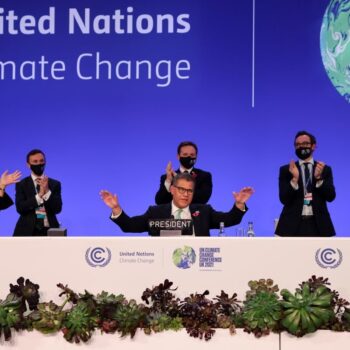The German government has proposed an ambitious law to reduce emissions from coal power. This measure is now at risk of being sacrificed to domestic politics, with potentially grave consequences for Germany’s leadership in international climate politics at a time when it holds the G7 presidency.
The proposal
A paper leaked last week from the German Economics and Energy Ministry revealed the government’s plans to clamp down on CO2-emissions from coal. Under the proposal, the oldest and most polluting German power stations would be assigned a carbon budget. They would then have to pay a fine for each tonne of emissions above this threshold, providing an incentive to scale back production. While this measure doesn’t target coal specifically, it is supposed to deliver, in practice, an additional emissions reduction of 22Mt CO2 from lignite power stations. This amount of additional CO2 reduction was agreed back in December last year as part of the Government’s Climate Action Plan. The measure would hit the regions of North-Rhine Westphalia and Lusatia (spanning Brandenburg and Saxony in Eastern Germany). Tackling German coal emissions is essential to meeting the country’s ambitious 2020 climate goals, and this is an important first step.
The politics
The energy transition was never going to be easy. The proposal has predictably sparked fierce resistance from utilities and trade unions, particularly RWE and the mining and energy-intensives union IGBCE. Leading local politicians from both main parties are joining the chorus of opposition amid hugely exaggerated concerns over job losses in the affected regions. Numerous top Christian Democrat (CDU) officials have spoken out against the proposal since the draft came out. A planned meeting among the governing coalition’s energy experts to discuss the proposal alongside other measures in the energy sector has now been cancelled twice by leading CDU politicians.
The Social Democrats (SPD), meanwhile, are taking all the flak over this, as they hold both the Energy/Industry and Environment Ministries and form the governments of North-Rhine Westphalia and Saxony. Chancellor Angela Merkel and the CDU seem to regard this as an SPD problem, to be sorted out internally by their coalition partner and most important competitor. Insiders expect a decision on the proposal before the Easter break and there is a risk that it will be watered down or scrapped entirely over the course of the next few days.
The danger
All this internal politicking risks undermining Germany’s domestic climate commitments, which puts into question the country’s leadership role in international climate politics. Independent analysis confirms that current measures are not enough to deliver on the 40% emissions reduction that Germany aims for by 2020 [1]. As coal combustion is responsible for over a third of Germany’s CO2-emissions [2] and progress in terms of emissions reductions in the transport and buildings sectors is extremely slow, neglecting to tackle emissions from coal essentially means giving up on the 40% target.
Angela Merkel invested considerable political capital in being the “climate chancellor” in the past, affirming Germany’s commitment to the 40% target at the Petersberg Climate Dialogue and in Lima last year. She seems keen to preserve this momentum in a year where Germany holds the G7 presidency and has invested in securing an ambitious climate deal at the COP21 in Paris. Failure to back domestic climate targets with legislation that can deliver will, however, be seen internationally as a de facto weakening of Germany’s mitigation contribution to the Paris talks.
If the Chancellor stays out of the debate she is in fact playing fast and loose with Germany’s international climate credentials. This is a dangerous game in a year where Germany’s partners depend on Angela Merkel and her government to deliver more than just rhetoric to get an ambitious deal at the COP21 in Paris.
[1] FÖS (2014) Klimaschutzplan lässt zu viel offen; DIW (2014) Wochenbericht Nr. 47
[2] IEA (2014) CO2 Emissions from Fossil Fuel Combustion Report
This project action has received funding from the European Commission through a LIFE grant. The content of this section reflects only the author's view. The Commission is not responsible for any use that may be made of the information it contains.



